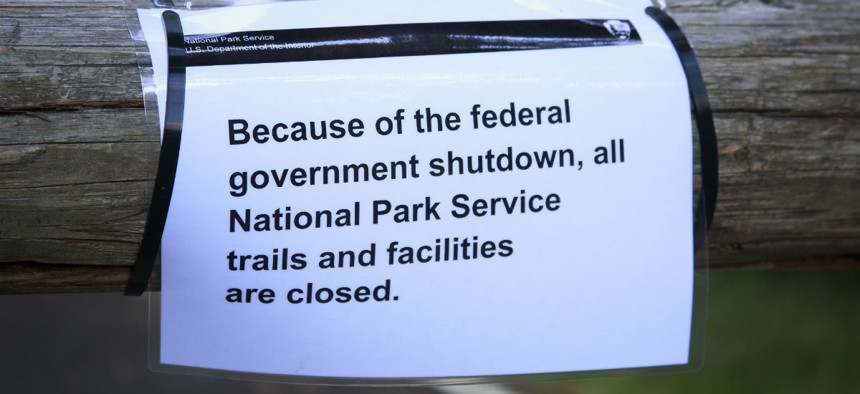
Mount Rainier National Park
As Congress Pushes Back Deadline, Agencies and White House Start Shutdown Prep
All sides say funding lapse can be avoided, but agencies plan for worst-case scenario.
While Congress took the first step on Thursday in temporarily preventing a government shutdown, federal agencies are not taking any chances and coordinating with the White House to prepare for an appropriations lapse.
The Obama administration has been adamant that a shutdown should and likely will be avoided, but has said sensible planning requires agencies to take precautionary steps to prepare for a scenario in which Congress fails to act. Lawmakers have until Friday to buy more time to reach an omnibus appropriations deal, and the Senate on Thursday passed a five-day stopgap measure that will now head to the House.
Even if the lower chamber follows in the Senate’s footsteps, as is expected, the shutdown deadline will be pushed back to just Dec. 16.
In the meantime, agencies are working with their general counsel offices and the Office of Management and Budget to update shutdown contingency plans. In the run up to the Oct. 1 deadline earlier this year, agencies publicly released their shutdown procedures -- including who would be furloughed and who would be forced to work without immediate pay -- for the first time since agencies were actually forced to shutter two years ago. While some agencies have said those plans have already changed over the last 10 weeks, none have put new documents forward.
Still, agency leaders held a conference call with OMB on Dec. 4 to remind agencies of their shutdown responsibilities and review their contingency plans, an OMB spokeswoman said.
Currently, the spokeswoman said, “prudent management requires that the government plan for the possibility of a lapse and OMB is working with agencies to take appropriate action. This includes agencies reviewing relevant legal requirements and updating their plans for executing an orderly shutdown.”
As part of that planning, the spokeswoman added, “Determinations about specific programs are being actively reviewed.”
President Obama said after signing in October the 10-week continuing resolution under which agencies are currently operating that he would not sign another short-term measure that continues fiscal 2015 spending levels, but White House Press Secretary Josh Earnest has since confirmed Obama would sign the five-day bill. An omnibus bill would provide line-by-line details for agency spending at the boosted funding levels agreed to in a budget deal struck in October.
“We have been clear that if members of Congress needed an extra day or two in order to pass legislation, that the president would ensure the government didn’t shut down while they were going through the legislative mechanics of passing a bipartisan budget agreement,” Earnest said earlier this week. “But Congress has had ample time to negotiate, and the only thing that's blocking negotiations right now is the insistence on the part of Republicans to use the budgetary process to advance their stalled ideological agenda.”
Democrats have complained Republicans have insisted on attaching policy riders to the omnibus package, and said differences remain for specific spending levels. While the budget deal set top-level funding for fiscal years 2016 and 2017, congressional appropriators are still ironing out how much money each specific agency and program will receive. Under the CR, agencies have postponed starting new projects and delayed eliminating existing ones, canceled bids for new contracts and faced other uncertainties.
“I continue fighting every day for a bipartisan, bicameral omnibus deal to keep our government open and off autopilot, without including poison pill riders or leaving any bills behind,” Sen. Barbara Mikulski, D-Md., ranking member of the Senate Appropriations Committee, said after the Senate passed the five-day CR. “Let’s finish our work now, so there is no government shutdown.”
The House is expected to pass the stop-gap funding bill Friday.







